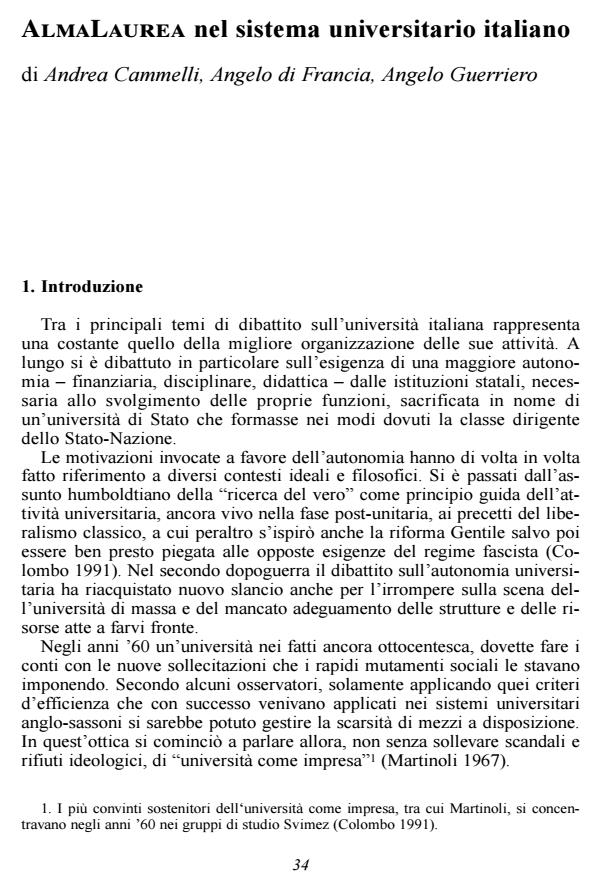AlmaLaurea nel sistema universitario italiano
Titolo Rivista SOCIOLOGIA DEL LAVORO
Autori/Curatori Andrea Cammelli, Angelo Di Francia, Angelo Guerriero
Anno di pubblicazione 2006 Fascicolo 2004/94
Lingua Italiano Numero pagine 23 P. Dimensione file 74 KB
DOI
Il DOI è il codice a barre della proprietà intellettuale: per saperne di più
clicca qui
Qui sotto puoi vedere in anteprima la prima pagina di questo articolo.
Se questo articolo ti interessa, lo puoi acquistare (e scaricare in formato pdf) seguendo le facili indicazioni per acquistare il download credit. Acquista Download Credits per scaricare questo Articolo in formato PDF

FrancoAngeli è membro della Publishers International Linking Association, Inc (PILA), associazione indipendente e non profit per facilitare (attraverso i servizi tecnologici implementati da CrossRef.org) l’accesso degli studiosi ai contenuti digitali nelle pubblicazioni professionali e scientifiche.
AlmaLaurea into the Italian university system Born in a narrow basement of the University of Bologna, the AlmaLaurea project has made a name for itself over the course of its first 10 years of activity as a highly qualified component of the entire Italian university system. It aims at monitoring the quality of the formative processes of graduates as well as their occupational condition and at facilitating the intersection between demand and supply of qualified labour. The institutionalisation as an inter-university consortium and the growing voluntary membership of an ever more substantial number of universities (36 universities, with 410,000 curricula vitae stored in a databank) has rendered AlmaLaurea a nearly indispensable point of reference for the universities’ governing bodies, for analysts, students, teachers, and for businesses seeking qualified personnel. AlmaLaurea’s uniqueness lies in having created an integrated system capable of guaranteeing documentation which is complete (universities are accepted into the Consortium on condition that they make available information on their entire student body), periodic (the surveys are taken at regular intervals), well-timed (year after year, a ‘snapshot’ of the universities’ internal and external performances may be obtained) and updatable (the databank is ‘living’ to the extent that the curricula vitae are updated by the graduates themselves and therefore keep up with the graduates’ professional pursuits). All of these factors are made possible by the extended use of information technologies, both for managing the graduate databank and for disseminating its services via the Internet.
Andrea Cammelli, Angelo Di Francia, Angelo Guerriero, AlmaLaurea nel sistema universitario italiano in "SOCIOLOGIA DEL LAVORO " 94/2004, pp , DOI: